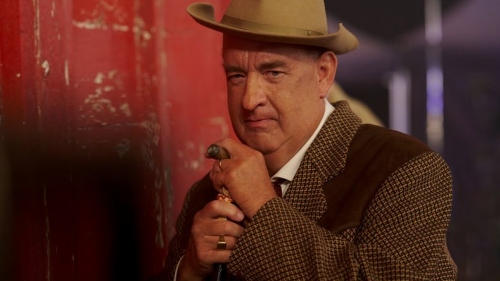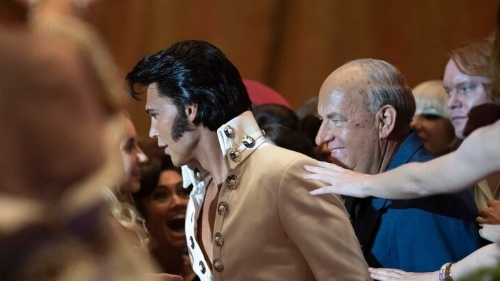
The King of Rock and Roll famously warned against criticizing “what you do not understand, son.” I confess: I do not quite understand the source of the attraction that Elvis Presley provoked in his most rabid fans when he was on top of the world. Unfortunately, after watching Baz Luhrmann’s attempt at an explanation in his new film, Elvis, I still don’t get it. During my time as a critic, I have learned that there is no substitute for a cohesive, coherent story that lands emotionally with audiences — not even the prettiest of technicolor renditions. Thus, while I will refrain from critiquing Presley’s music, I do have a thing or two to say about this latest, dysfunctional attempt at portraying his life on the big screen.
Luhrmann became a household name with 2001’s Moulin Rouge, arguably one of the most inventive, memorable, and visually arresting films of that decade. In the 20-plus years since, the Australian director has never approached the towering heights of that musical masterpiece, which would be fine except for the obvious fact that he has been trying hard to do so. With Elvis, however, he doubles down on trying to recapture that lost greatness. The result renders what could have been a naturally compelling, emotional story into a disjointed, boisterous hound dog that you simply wish you could return to sender.

The impressive young actor Austin Butler stars as the titular Memphis superstar, and though he’s given the unenviable task of portraying an icon, he acquits himself as well as one can considering the rather sloppy material he has to work with here. Co-starring beside him is two-time Oscar winner Tom Hanks, wearing a bodysuit and facial prosthetics, and chewing the scenery with a Dutch accent as Elvis’ longtime manager, the mysterious Colonel Tom Parker. Olivia DeJonge is good as Priscilla, though no other actor in the film reaches the depths that Butler and Hanks do.
In addition to producing and directing, Luhrmann also co-wrote the screenplay with his longtime collaborator Craig Pearce (The Great Gatsby), but the question this script never answers and hangs over the entire picture, is one that is relatively simply — what is this movie about, exactly? At first, it is billed as a story of intrigue, of the nasty steps that Parker may or may not have taken to exert control over Elvis and his finances, leading to his demise. As it goes on, the movie appears to be about Elvis’ complex relationship to “white country music and black R&B,” as President Jimmy Carter described it following Presley’s death at just 42 years old. Still, at other times, the film seems to be about Elvis’ views on civil rights, persecution in America, and the source of such unimaginable talent. Who knows? Surely not the screenwriters, and even after watching this movie, definitely not this critic. When a movie with this much weight (not just from the person it portrays, but the overwrought camera work, the loud, bombastic soundscape, the screaming fans and constantly flashing cameras) it needs a solid foundation made of strong storytelling building blocks in order to survive. Elvis is built upon the flimsiest of foundations, and collapses under its own gravitas about one-third of the way into its 159-minute runtime.

Of course, music-driven biopics are inherently challenging, and Luhrmann deserves some kudos for trying to tackle this story as someone who experienced Elvis from overseas. The fundamental problem is that these kinds of biopics tend to depict similar stories over and over — the talented star; the overbearing manager, family, or band member; the fights; the drugs; and ultimately, the destruction. Such stories are inherently compelling in their own right but they’ve also become such a cliché that cinematic portrayals of them should come with their own “break in case of emergency” glasses.
Luhrmann tries to overcome this conundrum by injecting Elvis with the mystical elements that arguably made Moulin Rouge so successful. Hanks plays the Colonel almost like Jim Broadbent played Harold Zidler, and Luhrmann even brings back Richard Roxborough, the Duke who tried to assault Nicole Kidman‘s Satine, to play Elvis’ father. Luhrmann’s camera spins around into the theater — here, not the Moulin on top of Montmartre, but the “International Hotel” in Las Vegas. He surrounds a marque with flashing bulbs, plays melancholic tunes, then modern ones, and he suffuses the story with a narrator (the Colonel) who is clearly a survivor with a sad story to tell. To top all of this off, Luhrmann speeds and slows the action, the dancing, the leg kicking, and the pelvic thrusting. His camera enters the darkness where his dying characters live, and it roams comfortably through shadows.

Elvis is an iconic figure, no doubt. He’s as historic as the political leaders whose lives he closely followed. The emotional ups and downs of his life, the reasons for and the source of his talent, all provide a rich tapestry from which to cut an absorbing take. What was the source of his inspiration? Of his motivation? Of his talent? Was the Colonel always so bad for him? How exactly did he take off? Did he really care about civil rights as much as Luhrmann claims? All of these questions are given a few minutes of screentime here and there, but none given the in-depth treatment they demand.
Thankfully, as he usually does, Luhrmann has surrounded himself with an impressive array of below-the-line talent on Elvis, including cinematographer Mandy Walker (Australia), whose work is picture-perfect, from Presley’s dusty days in Memphis to his neon nights in Vegas. Meanwhile, Luhrmann’s wife, Catherine Martin, is also along for the ride this time to handle both production and costume design. As the Australian with the most Oscars in history, Martin’s work is always exquisite, and here it really elevates the proceedings. Not only does she nail all of Elvis’ iconic costumes (a given), but she surrounds him with well-dressed people as the story shifts from the late-’50s into the mid-’70s, and creates a variety of different stages for the singer’s various tours. If Elvis was to be graded on Martin’s technical prowess alone, it would probably be the best movie of the year so far.
Going forward, one hopes that the undeniably talented Luhrmann will resist the bombastic visuals that worked for him in the past and that are clearly always on his mind, and instead search for a solid script that can anchor his unique vision. He certainly knows how to put on a good show — a great show, even, but it’s simply that — a show, like a Vegas-style cabaret dance. Wise men say that only fools rush in to make a movie about a man who it thinks is so well-known that it neglects to take the time to really get to know him itself in any meaningful way beyond a slick highlight reel.
Grade: C
Elvis premiered at the Cannes Film Festival and is now playing in U.S. theaters.





